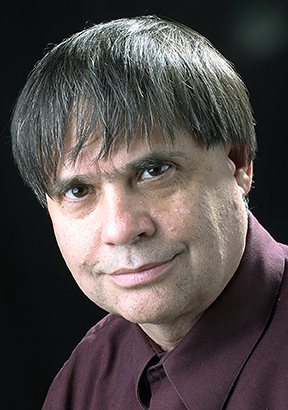Related Research Articles

Niklaus Emil Wirth was a Swiss computer scientist. He designed several programming languages, including Pascal, and pioneered several classic topics in software engineering. In 1984, he won the Turing Award, generally recognized as the highest distinction in computer science, "for developing a sequence of innovative computer languages".

David Lee Chaum is an American computer scientist, cryptographer, and inventor. He is known as a pioneer in cryptography and privacy-preserving technologies, and widely recognized as the inventor of digital cash. His 1982 dissertation "Computer Systems Established, Maintained, and Trusted by Mutually Suspicious Groups" is the first known proposal for a blockchain protocol. Complete with the code to implement the protocol, Chaum's dissertation proposed all but one element of the blockchain later detailed in the Bitcoin whitepaper. He has been referred to as "the father of online anonymity", and "the godfather of cryptocurrency".
A Byzantine fault is a condition of a system, particularly a distributed computing system, where a fault occurs such that different symptoms are presented to different observers, including imperfect information on whether a system component has failed. The term takes its name from an allegory, the "Byzantine generals problem", developed to describe a situation in which, to avoid catastrophic failure of a system, the system's actors must agree on a strategy, but some of these actors are unreliable in such a way as to cause other (good) actors to disagree on the strategy and they may be unaware of the disagreement.

Barbara Liskov is an American computer scientist who has made pioneering contributions to programming languages and distributed computing. Her notable work includes the introduction of abstract data types and the accompanying principle of data abstraction, along with the Liskov substitution principle, which applies these ideas to object-oriented programming, subtyping, and inheritance. Her work was recognized with the 2008 Turing Award, the highest distinction in computer science.

Shlomi Dolev is a Rita Altura Trust Chair Professor in Computer Science at Ben-Gurion University of the Negev (BGU) and the head of the BGU Negev Hi-Tech Faculty Startup Accelerator.
A fundamental problem in distributed computing and multi-agent systems is to achieve overall system reliability in the presence of a number of faulty processes. This often requires coordinating processes to reach consensus, or agree on some data value that is needed during computation. Example applications of consensus include agreeing on what transactions to commit to a database in which order, state machine replication, and atomic broadcasts. Real-world applications often requiring consensus include cloud computing, clock synchronization, PageRank, opinion formation, smart power grids, state estimation, control of UAVs, load balancing, blockchain, and others.
Özalp Babaoğlu, is a Turkish computer scientist. He is currently professor of computer science at the University of Bologna, Italy. He received a Ph.D. in 1981 from the University of California at Berkeley. He is the recipient of 1982 Sakrison Memorial Award, 1989 UNIX InternationalRecognition Award and 1993 USENIX AssociationLifetime Achievement Award for his contributions to the UNIX system community and to Open Industry Standards. Before moving to Bologna in 1988, Babaoğlu was an associate professor in the Department of Computer Science at Cornell University. He has participated in several European research projects in distributed computing and complex systems. Babaoğlu is an ACM Fellow and has served as a resident fellow of the Institute of Advanced Studies at the University of Bologna and on the editorial boards for ACM Transactions on Computer Systems, ACM Transactions on Autonomous and Adaptive Systems and Springer-Verlag Distributed Computing.
The ACM Symposium on Principles of Distributed Computing (PODC) is an academic conference in the field of distributed computing organised annually by the Association for Computing Machinery.

Cynthia Dwork is an American computer scientist best known for her contributions to cryptography, distributed computing, and algorithmic fairness. She is one of the inventors of differential privacy and proof-of-work.

Bitcoin is the first decentralized cryptocurrency. Nodes in the peer-to-peer bitcoin network verify transactions through cryptography and record them in a public distributed ledger, called a blockchain, without central oversight. Consensus between nodes is achieved using a computationally intensive process based on proof of work, called mining, that secures the bitcoin blockchain. Mining consumes large quantities of electricity and has been criticized for its environmental impact.
Amos Fiat is an Israeli computer scientist, a professor of computer science at Tel Aviv University. He is known for his work in cryptography, online algorithms, and algorithmic game theory.
A blockchain is a distributed ledger with growing lists of records (blocks) that are securely linked together via cryptographic hashes. Each block contains a cryptographic hash of the previous block, a timestamp, and transaction data. Since each block contains information about the previous block, they effectively form a chain, with each additional block linking to the ones before it. Consequently, blockchain transactions are irreversible in that, once they are recorded, the data in any given block cannot be altered retroactively without altering all subsequent blocks.

Cardano is a public blockchain platform. It is open-source and decentralized, with consensus achieved using proof of stake. It can facilitate peer-to-peer transactions with its internal cryptocurrency, ADA.
Cryptocurrency and crime describe notable examples of cybercrime related to theft of cryptocurrencies and some methods or security vulnerabilities commonly exploited. Cryptojacking is a form of cybercrime specific to cryptocurrencies that have been used on websites to hijack a victim's resources and use them for hashing and mining cryptocurrency.
Rachid Guerraoui is a Moroccan-Swiss computer scientist and a Full Professor in the School of Computer and Communication Sciences (IC) at EPFL, known for his contributions in the fields of concurrent and distributed computing. He is an ACM Fellow and an associate (area) editor of the Journal of the ACM. In 2018–19, he held the position of Chair in Informatics and Computational Science for Distributed Computing at the Collège de France.

Robert Eliot Shostak is an American computer scientist and Silicon Valley entrepreneur. He is most noted academically for his seminal work in the branch of distributed computing known as Byzantine Fault Tolerance. He is also known for co-authoring the Paradox Database, and most recently, the founding of Vocera Communications, a company that makes wearable, Star Trek-like communication badges.
Michela Taufer is an Italian-American computer scientist and holds the Jack Dongarra Professorship in High Performance Computing within the Department of Electrical Engineering and Computer Science at the University of Tennessee, Knoxville. She is an ACM Distinguished Scientist and an IEEE Senior Member. In 2021, together with a team al Lawrence Livermore National Laboratory, she earned a R&D 100 Award for the Flux workload management software framework in the Software/Services category.
Mathias Payer is a Liechtensteinian computer scientist. His research is invested in software and system security. He is Associate Professor at the École Polytechnique Fédérale de Lausanne (EPFL) and head of the HexHive research group.
The transaction malleability problem is a vulnerability in blockchain which can be exploited by altering a cryptographic hash, such as the digital signature used to identify a cryptocurrency transaction. Transaction malleability is considered to be one of the largest ongoing threats to blockchain technology, as it can compromise financial transactions such as Bitcoin and other cryptocurrency transactions, and cause other issues in the network.
In computer science, choreographic programming is a programming paradigm where programs are compositions of interactions among multiple concurrent participants.
References
- ↑ Roger Wattenhofer's personal page on ETH Zurich's website
- ↑ "Biographies of Invited Speakers". 24th International Symposium on Graph Drawing & Network Visualization.
- ↑ "Keynote by Prof. Roger Wattenhofer". ACM SenSys 2017.
- ↑ Roger Wattenhofer's bibliography on DBLP
- ↑ "Roger Wattenhofer". Google Scholar.
- ↑ Wattenhofer, Roger (2016). The science of the blockchain. Inverted Forest Publishing. ISBN 978-1-5227-5183-0.
- ↑ Idit Keidar, ACM-SIGACT News Distributed Computing Column, June 2013
- ↑ Decker, Christian; Wattenhofer, Roger (1 January 2014). "Bitcoin Transaction Malleability and MtGox". Computer Security - ESORICS 2014. Lecture Notes in Computer Science. Vol. 8713. pp. 313–326. arXiv: 1403.6676 . doi:10.1007/978-3-319-11212-1_18. ISBN 978-3-319-11211-4. S2CID 14555943.
- ↑ "The Mt. Gox Bitcoin Debacle: An Update". 2015-11-03.
- ↑ "The Troubling Holes in MtGox's Account of How It Lost $600 Million in Bitcoins".
- ↑ "Roger Wattenhofer". IMDb .